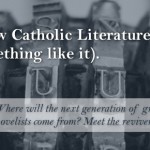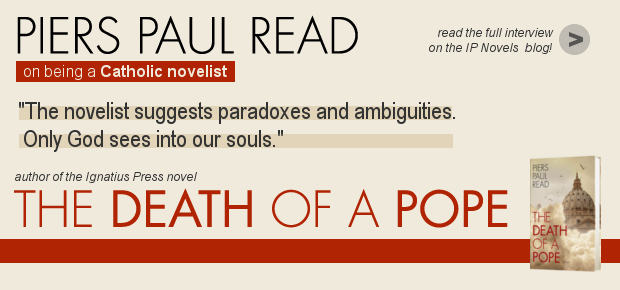Things tagged Catholic literature
Articles
-

First Things has a bracing, challenging, and inspiring new article by Catholic poet Dana Gioia on the topic of “The Catholic Writer Today”. Here’s a couple of excerpts: The collapse of Catholic literary life reflects a larger crisis of confidence in the Church that touches on all aspects of religious,… Read more »
-

An Interview with James Casper, author of “Everywhere in Chains”
by Ignatius Press Novels
December 5, 2013 2:46 pm Leave a Comment
Everywhere in Chains is the first novel by James Casper published by Ignatius Press. It touches upon many themes, including the controversial topic of how society treats prisoners with mental illness. We interviewed the author via e-mail on writing, how social issues can be addressed via literature, and the attraction… Read more »
-

Among the many challenges of Roman Catholic life since 1963 is the tension between fidelity and inclusiveness. On the one hand, to be a Roman Catholic is to be faithful to Christ–not in some vague way, but in loving knowledge of Scripture, the sacraments and the teachings of His Church…. Read more »
-

Writing in Catholic World Report, Russell Shaw has a lament for the now largely vanished Catholic subculture that once permeated most American cities. He says that the demise of this culture has brought about the demise of a certain type of Catholic writer, using the novelist and short story writer… Read more »
-

Hello! I’m honored to be writing to you from my attic sitting-room in Scotland. Ignatius Press has invited me, one of its most recent living authors, to post about Catholic literature. This I am delighted to do. Indeed, I have so much to write on the subject that I am… Read more »
-

We sit down with the author of the new Ignatius novel Ceremony of Innocence, Dorothy Cummings McLean. A Canadian writer living abroad, she has been a regular contributor to The Catholic Register (Toronto). Her first book, Seraphic Singles, is a popular work of nonfiction. Until Wednesday, Ceremony of Innocence is… Read more »
-

The New Catholic Literature Revival, Or Something Like It
by Dan at Ignatius
September 27, 2013 5:33 pm 11 Comments
We tend to be readers here at Ignatius Press. You might imagine. But one of the reasons for starting the Ignatius Press Novels website was the experience of being frustrated readers. It’s easy to get the feeling, especially if you follow mainstream press coverage of book releases and best-seller lists,… Read more »
-

The Catholic Novelist in a Secular Society
by Piers Paul Read
September 6, 2013 1:46 pm Leave a Comment
An excerpt from Piers Paul Read’s essay “The Catholic Novelist in a Secular Society”, from his book Hell and Other Destinations: The Catholic writer has to acknowledge that today’s non-Catholic reader may be put off his fiction by his Catholicism… Of course such an orthodox Catholic author may have his… Read more »
-


Piers Paul Read is perhaps best known for his non-fiction account of the 1972 airline disaster involving Uruguayan Air Force Flight 571, a plane carrying 45 passengers that crashed in the Andes. His book, Alive: The Story of the Andes Survivors, became a world-wide bestseller and, in 1993, was made into a film starring Ethan Hawke.
Mr. Read is also an accomplished novelist and playwright, as well as a journalist, biographer, and social commentator. His recent works include the novels Knights of the Cross and Alice in Exile, and the non-fiction titles The Templars: The Dramatic History of the Knights Templar; Alec Guinness: The Authorised Biography; and Hell and Other Destinations.
Piers Paul Read’s novel, The Death of a Pope, has garnered acclaim from fellow novelists Ron Hansen and Ralph McInerny. A thriller that intertwines real events with fiction, The Death of a Pope touches on many themes that are hot-button issues in the Catholic Church and the world today.
(Note: this interview was originally published in 2009 in conjunction with the release of The Death of a Pope.)
What inspired you to write The Death of a Pope?
When I was young I was a zealous exponent of Liberation Theology. As I grew older I like to think I grew wiser and came to see how ‘social’ Catholicism, however superficially appealing in the face of the suffering caused by poverty and injustice, in fact falsifies the teaching of the Gospels. This is particularly true when it condones or even advocates the use of violence: as Pope Benedict XVI puts it in his encyclical Spe Salvi, “Jesus was not Spartacus, he was not engaged in a fight for political liberation”. Yet this was precisely the message preached from the pulpits in Catholic parishes and taught in Catholic schools in the last decades of 20th century. The two visions of what charity demands of a Christian confront one another on the issue of the AIDS epidemic in Africa. It is this confrontation that gave me the idea for my novel.
You’ve written quite a bit in both fiction and non-fiction. The Death of a Pope, though fiction, is interwoven with real events, situations, and ideological tensions. Do you see a clear line between what you create and the real world you’re drawing from?
I have always taken the view that a work of non-fiction should be just that, whereas anything is allowed in a novel. In Alive: The Story of the Andes Survivors, for example, there are snatches of dialogue which may not use the precise words used by the characters but they are not invented: the exchanges come from my interviews with the survivors.
As a novelist I am a realist and use actual events and institutions to add verisimilitude to the story. There is a danger of tipping the novel into a kind of fictionalised journalism, but that is avoided if the story itself comes from the imagination and the fictional characters have distinct personalities and convincing motives for what they do.
The Death of a Pope begins with a series of quotes, including one from Polly Toynbee from the UK paper The Guardian, claiming that “The Pope kills millions through his reckless spreading of AIDS.” Is this an attitude that is widespread in journalism today?
The pope that Polly Toynbee had in mind was Pope John Paul II but she would level the same charge, after his air-born press conference on the way to Africa in March, 2009, at Pope Benedict XVI. Toynbee is an atheist and militant secularist, and she sees in Catholic misgivings about the use of condoms to prevent the spread of AIDS a stick with which to beat the Church. Her views are widely shared in the secular media, even if they are not so pungently expressed. Liberal Catholics, too, such as the late Hugo Young — a highly influential columnist — sometimes adopted this secularist outlook: he talked of the record of Pope John Paul II as “an offence against elementary tenets of liberal decency”.
In a way, The Death of a Pope is quite critical of the more radical form in which Liberation Theology can manifest itself. Is this based on your own experience with radicalism when reporting from El Salvador?



